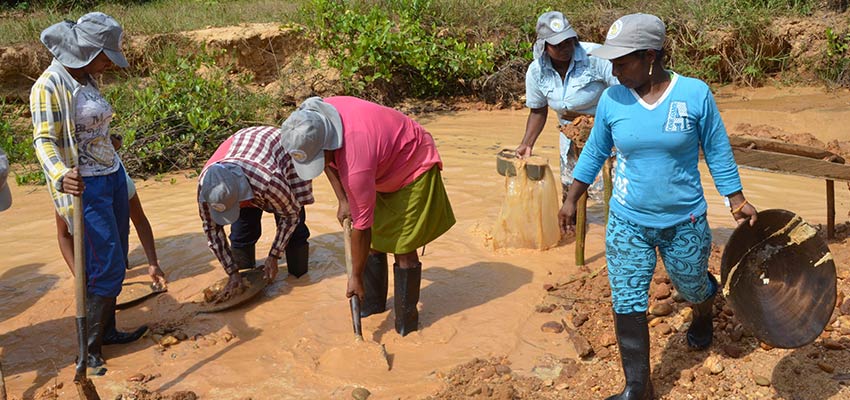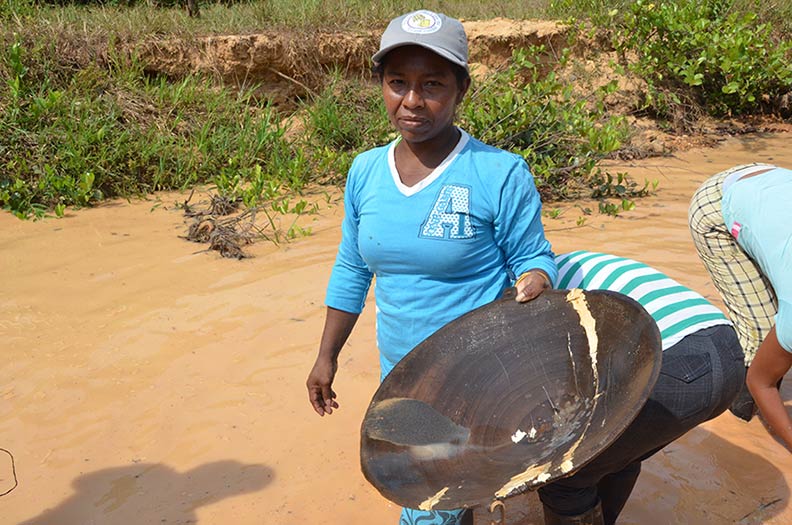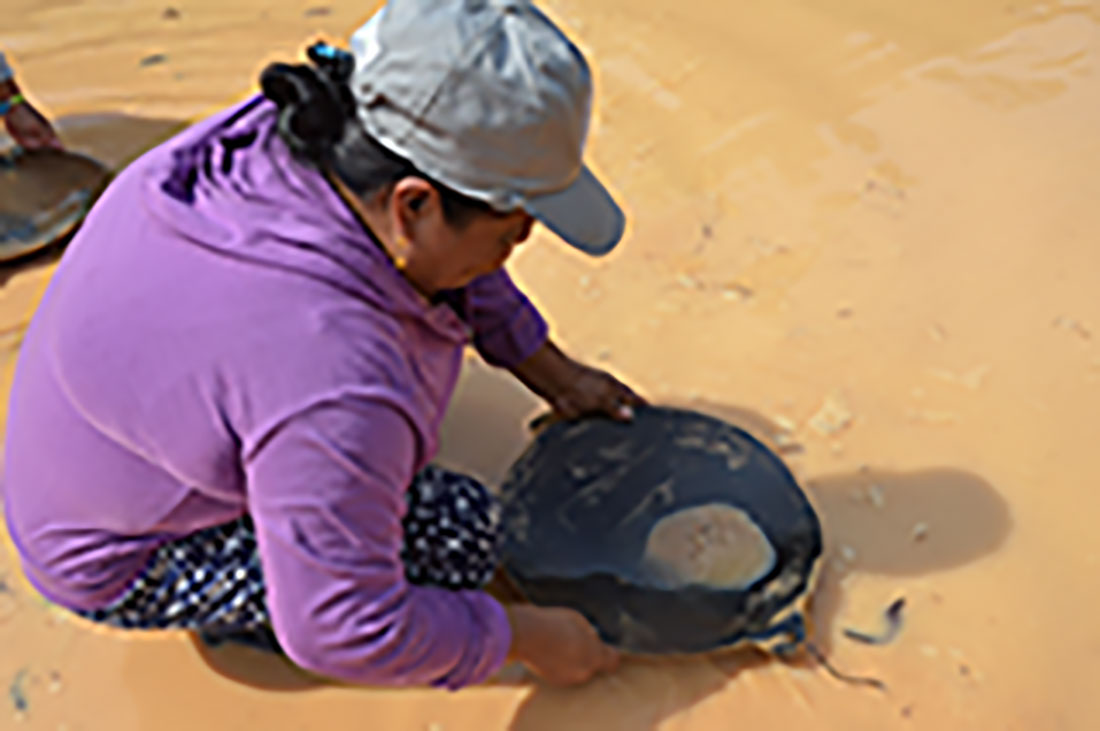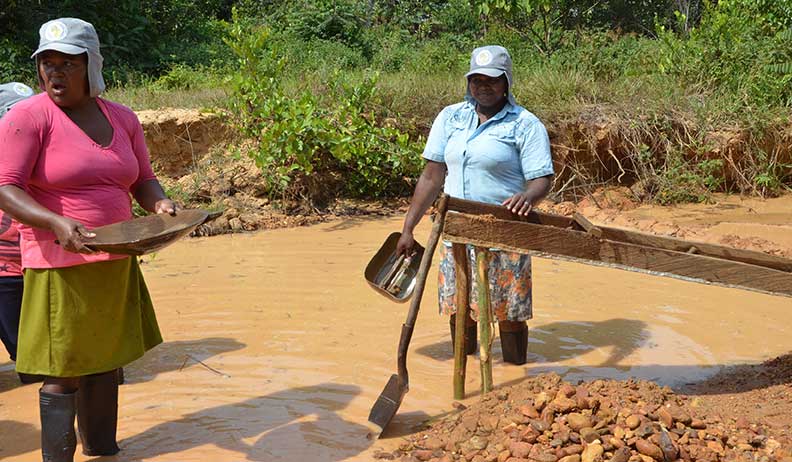
The MIT D-Lab Inclusive Economies program and the Alliance for Responsible Mining (ARM) in Colombia have joined together to launch a two-year program addressing gender-based violence affecting women engaged in artisanal and small-scale gold mining in the Antioquia region of Colombia. The project uses an innovative movement-building approach to foster women miners’ associations and homegrown advocacy to address social and economic gender-based violence in mining communities in Andes, Zaragoza, Nechí, and El Bagre in Antioquia, Colombia.
The lives and challenges of artisanal and small-scale women miners in Antioquia
Artisanal and small-scale mining accounts for 60 percent of all gold extraction in Colombia. With mining traditionally considered a masculine activity, women comprise only five percent of the official mining labor force. Women miners in the municipalities of Bajo Cauca and Andes typically carry out peripheral activities such as gold panning and scavenging tailings discarded by male miners to extract left-over gold. These activities require little to no qualification, receive limited economic or social recognition, and are often exploited by middlemen. Given the informality of this sector and limited financial return, women working in artisanal and small-scale mining commonly augment their income through informal food businesses, seasonal agriculture work, and transactional sex, among others. For some of these women, harassment, sexual violence, and domestic violence are commonplace.

ARM and MIT D-Lab join forces
The Alliance for Responsible Mining was established in 2004 and is a leading global expert on artisanal and small-scale mining, working to transform the sector into a socially and environmentally responsible activity, while improving the quality of life of artisanal miners, their families, and communities. Through a 2018 study, ARM identified gender inequality and gender-based violence as one of the critical issues facing this community and has started to tackle the problem through programs for strengthening women miners associations and has conducted awareness-raising campaigns with women. Since January of 2019, MIT D-Lab staff and students have been working with women miners in the communities of Bajo Cauca and Andes to overcome socioeconomic and environmental challenges. During the needs assessment phase of this work, it became clear that women miners have limited rights and opportunities for influencing the sector, that gender-based violence is pervasive -- and that women are eager to organize themselves.
Creating a safe space for collective action through co-design and advocacy skills
Building on this momentum and their combined expertise, ARM and MIT D-Lab are working to build a safe space for collective action and co-design and improving women miners' design and advocacy skills, paving the way for women miners to organize themselves in associations, identify specific challenges, and implement an advocacy roadmap to address gender-based violence and environmental degradation in their communities. Empowering women to advocate for recognition of their economic role in the mining value chain will also leverage their ability to organize against other forms of gender discrimination and violence.

Public narrative, creative and advocacy capacity building
The program combines methodologies created by Harvard University, MIT D-Lab, and ARM. Public Narrative (Harvard) uses personal and collective stories to mobilize groups into action around joint objectives. MIT D-Lab’s Creative Capacity Building (CCB) approach uses co-design to harness local creativity and knowledge to design solutions to identified challenges. Advocacy Capacity Building, an approach used by ARM, empowers miners with advocacy skills to influence changes in governance at local and national levels. By combining these tried and tested methodologies, the project is providing women miners in four communities (Andes, Zaragoza, Nechí, and El Bagre) with a safe space to share stories of their reality of gender-based violence and a framework to identify specific challenges and collectively build solutions. The goal is for women miners to see themselves as capable of devising their own way forward, working effectively and safely together to do so, sparking local solidarity and self-determination.
The plan: needs and risk assessment, training and sharing learning and tools
The project will start with an assessment of risks and opportunities, detailing barriers for 50 women miners to engage with formal markets, using ARM’s process CRAFT, a Passport to formal markets. Following activities include refining the training methodology and curriculum combining Public Narrative, Creative Capacity Building, and Advocacy Capacity Building; Trainings of Trainers; workshops for women miners in four communities; setting up and registering women miners’ associations; supporting the co-design and the initial implementation of an action plan for overcoming gender-based violence (including engagement with relevant actors); and capturing, analyzing, and publicizing learning and tools.
The goals: miner associations and a toolkit
By the end of the project, the team aims to have supported the development of two to three women miner associations to be working on socioeconomic gender-based violence and environmental challenges in Bajo Cauca and Andes and to have published a toolkit on movement-building for women engaged in extractive industries.

This program is funded by USAID’s Resilient, Inclusive, & Sustainable Environments (RISE): A Challenge to Address Gender-Based Violence in the Environment program
Related information
MIT D-Lab Program: Building Inclusive Economy with Small Scale Miners - Colombia
Contact
Libby McDonald, MIT D-Lab Lecturer and Inclusive Economies Specialist

